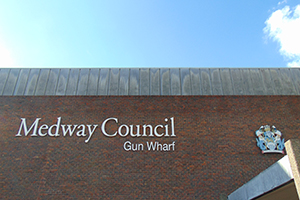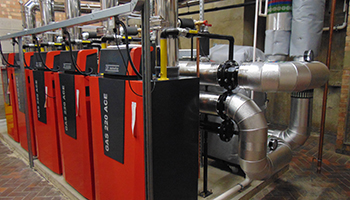THE RISE OF OFFSITE

In the building services world, use of offsite fabrication equipment and techniques is gaining traction as a means of achieving improved quality and on-site safety through greater efficiency.
When it comes to heating, use of offsite fabrication techniques offers huge benefits as the requirements of the project and site can be factored in from the outset. And while in the construction industry offsite manufacture historically tends to be linked with new build, in heating it is perfectly suited for use on both new build and refurbishment projects.
This is particularly important given that improving the efficiency of the UK’s existing buildings – and the heating service – remains a major challenge for the building services industry.
One example is the option to use bespoke-designed rig and cascade systems to achieve time and space-saving solutions for multiple boiler installations. These offsite fabricated solutions also reduce on-site hot works, improving site safety. And as they are produced under factory conditions, there is the added benefit of factory quality assurance and pre-release testing.
Fast acting
 |
| Medway Council’s offsite project |
So how and where is this heating technique used? A case in point is the recent boiler replacement programme carried out for Medway Council at Gun Wharf, its main offices in Kent.
Replacing ageing or inefficient boiler plant with multiple highefficiency condensing boilers is a cost-effective solution. Not only does it improve the reliability and effectiveness of the heating provision, but it helps generate a more comfortable – and more productive – environment for occupants.
So, when the existing boilers at Gun Wharf came to the end of their serviceable life, the Council were keen to act fast to replace the dated boiler plant. As the building needed to remain operational throughout the upgrade, minimising disruption and heating downtime was a key consideration.
Contractors TSS Facilities recommended installing five Remeha Gas 220 Ace floorstanding boilers with a plate heat exchanger (PHE) to achieve more reliable and effective heating. PHEs are increasingly applied to refurbishment projects to achieve hydraulic separation between the boiler circuit and the heating circuit, and so optimise boiler performance and longevity. But a lack of available space within the plantroom at Gun Wharf presented an added challenge.
Right size
The boilers were selected partly due to their small footprint and width, and also because of the Remeha offsite fabricated cascade options that would facilitate installation.
“We’ve fitted Remeha boilers for many years and are impressed with the products and service,” says Mark Basset, mechanical installations and asset manager at TSS Facilities.
Remeha worked with TSS Facilities to design a bespoke pipework arrangement that would ensure a space and time-saving boiler cascade configuration and integrate a PHE into the design.
The cascade arrangement needed to accommodate the space constraints and connect easily to the existing system. This would save TSS Facilities on-site time and labour while simultaneously achieving the most effective use of the space available.
After preparing 3D drawings of the layout, Remeha produced the pipework assembly in sections off site. These drawings then formed part of a documentation pack for the client.
Future maintenance
To overcome the plantroom space restrictions, the PHE and the pump were positioned behind the boilers. The pipework was then configured so that the system connection faced upwards, as requested by TSS Facilities.
 |
| An offsite fabricated solution in place and operational |
“Having the option to design the position of the PHE and pump ahead of installation meant that we could improve access for easier future maintenance and servicing,” Basset adds. “And while the pipework was being configured offsite, we were able to work on the system pipework, which sped up the installation process.”
Once the equipment was delivered to site, TSS Facilities bolted together the boilers, pipework connection components and the PHE, on its wheeled frame, and connected them to the existing system. It was a seamless process, as Basset explains: “The project went well from start to finish.
Having the boilers delivered in an offsite fabricated system made our lives so much easier. It allowed us to schedule the project and team more accurately, increasing our productivity. The customer benefits too, with reduced costs and disruption at the installation stage, and easier servicing in the future.”
Applying this heating solution smoothed the heating upgrade process, as consultant John Richardson, working on behalf of the Council, says: “By using the Remeha Gas 220 boilers, the contractor could strip out the old plant and carry out pipework modifications while the boiler sets were being fabricated off site.
“This installation technique enabled the Council to control the shutdown period required to complete the contract. The fully modulating Remeha boiler plant, in conjunction with upgraded controls, have greatly enhanced the building’s efficiency and the Council’s carbon footprint.”
Benefits for all
Medway Council is benefitting from more efficient, more reliable heating following minimal disruption. The consultant can be assured that the specification and customer requirements have been met. And the contractors see improved site productivity and reduced installation time, which ultimately keep costs lower.
With offsite fabricated heating techniques like this available to provide rapid, quality solutions for improved heating efficiency, everyone’s a winner, including the environment.
Paul Arnold is product manager for Remeha







